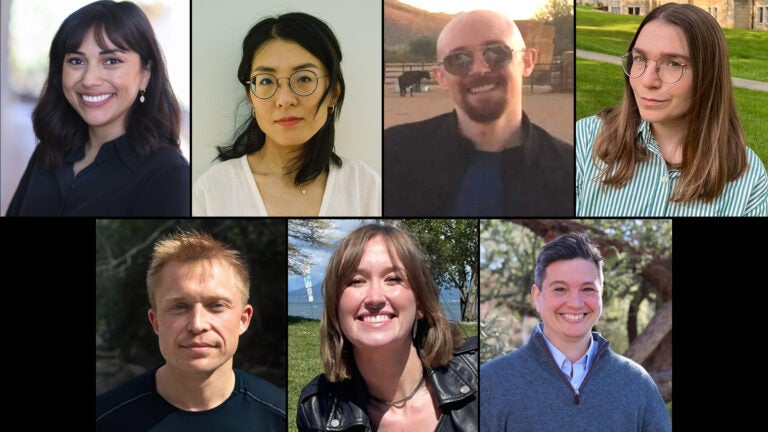
New faculty members expand the scope of USC Dornsife’s humanities this fall
New faculty members at the USC Dornsife College of Letters, Arts and Sciences will teach classes and conduct research on a broad range of topics, from feminist philosophy to the works of Dostoevsky.
Merrick Anderson | Assistant Professor of Philosophy
Merrick’s research focuses on ancient Greek philosophy. In particular, he works on the moral thought of Plato and his intellectual predecessors as well as philosophical method in early Greek philosophy. After writing a series of articles on the virtues of justice and courage in Plato’s Republic, he recently published his first book, Just Prospering? Plato and the Sophistic Debate about Justice. Part one in the book surveys a fifth-century BCE debate about whether being just is good for the just individual or not. In part two, Merrick reflects on Plato’s response to that debate in the following century.
Christina Dietz | Assistant Professor of Philosophy
Dietz received her PhD in philosophy at the University of Oxford. Her doctoral thesis, “Essays on the Emotions,” was supervised by renowned philosopher and logician Ofra Magidor. From 2020 to 2023, she was a research fellow at the Dianoia Institute of Philosophy at Australian Catholic University. Her research examines foundational issues within the philosophy of emotion, probing their nature, intentional content, and epistemic roles. She also explores the relation between various models of disability and well-being outcomes.
J. Dmitri Gallow | Associate Professor of Philosophy
Dmitri is interested in foundational questions about probability, causation, rational choice and the relationship between them. Common sense, the law and scientific theories all involve probabilities, but there is confusion and disagreement about their true meaning. Are they just about frequencies, ignorance or objective dispositions? Similarly, there’s debate over causation — whether it makes sense in the world revealed by modern physics, as Bertrand Russell suggested. Yet, probabilities and causation are crucial in rational decision-making, moral judgments and legal responsibility. Dmitri’s research explores the nature of probabilities, causation, and their role in rational choice and moral and legal responsibility.
Jane Hu | Assistant Professor of English
Hu’s research locates the aesthetic origins of contemporary Asian Anglophone novels and films in Victorian genre fiction. She does so by examining the relationship between literary genres and racial stereotypes as both classificatory systems that organize and systems that orient how one looks at the world. Before joining the Department of English, she was a postdoc with the USC Society of Fellows in the Humanities, and she previously taught critical theory courses at California Institute of the Arts.
Chloe Papadopoulos | Assistant Professor of Slavic Languages and Literatures
Papadopoulos studies 19th-century Russian literature and visual culture. Her current research considers why the medieval past occupied such a prominent place in the cultural imaginary during an exceptionally modern historical moment — the Great Reforms. Papadopoulos is also a specialist in Dostoevsky studies and has developed a portfolio of research projects that consider Dostoevsky’s work outside of traditional Russian literary perspectives. She serves on the Readers Advisory Board of the North American Dostoevsky Society and is assistant editor of Bloggers Karamazov, the official blog of the North American Dostoevsky Society.
Max Strassfeld | Associate Professor of Religion
Strassfeld, who uses the pronoun they, specializes in late antique Jewish texts called rabbinic literature. They blend trans studies and queer theory with ancient legal discussion. They also have written for popular venues on the Christian evangelical theologies that underpin recent anti-trans legislation in the U.S. A recipient of numerous awards, including the Berlin Prize, Strassfeld earned their doctorate from Stanford University.
Emily Tilton | Assistant Professor of Philosophy
Most of Tilton’s research is in feminist epistemology. Many feminist epistemologists condemn “traditional” or “neutral” conceptions of objectivity as inimical to feminist aims. However, Tilton thinks that traditional conceptions of objectivity actually put feminists in the best position to produce rigorous, intersectional analysis. Some of Tilton’s research connects feminist critiques of neutrality to political anxieties that she thinks are detrimental to the feminist project. She says her work also has implications for how to investigate and explain specific aspects of oppressive societies, like rape culture.
She is also interested in sexual ethics and consent. Her published work (with Jonathan Ichikawa, professor of philosophy at the University of British Columbia) concerns how, and when, deception invalidates consent. More broadly, she is interested in striking the right balance between respecting individual autonomy and avoiding an implausibly individualistic perspective where sexual partners look out only for themselves.
Gabriela Valenzuela | Assistant Professor of English
Valenzuela studies U.S. Central American and Latine literature from the 19th century to the present, with a focus on transnationalism, gender and sexuality, racial capitalism, and print culture. She explores Central American storytelling as expansively as she possibly can, and in complicating fixed analyses about centroamericanidad — the cultural, historical and social identity of Central America — that cast this Latine group exclusively as either newcomers to the U.S. or as perpetual migrants of crises. Valenzuela employs interdisciplinary methods, including close reading, archival research and queer theory, to read the many, diverse texts that constitute U.S. Central American literature.